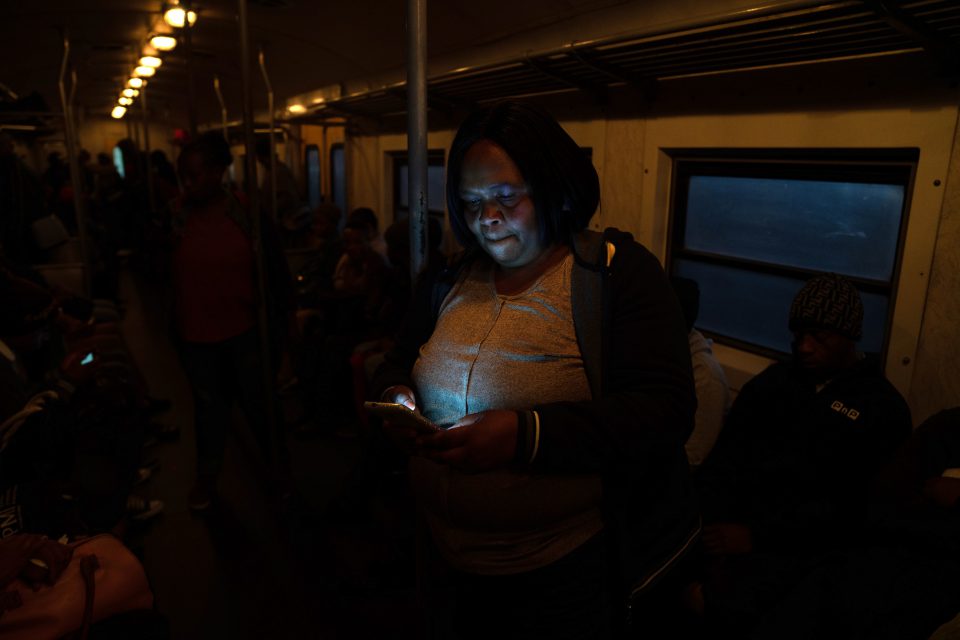Train commuters fight the cold with plastic and tape
Parliament is considering using R2 billion meant for the country’s depleted railways to pay part of a debt incurred by private motorists. Meanwhile, commuters ride in windowless trains.
Author:
23 August 2019

Early in the morning, there is a sharp stench of urine on the train platforms in the bowels of Johannesburg’s Park Station. Toilets are dysfunctional. At 4.30am, one of the shadows being cast on platform six by the few flickering fluorescent bulbs belonged to Phindile Sithole, 43. She was waiting for the 0311 train to Springs.
Sithole laughs often, even in the fetid darkness. She lives in Jeppestown on the eastern edge of Joburg’s inner city and takes the train every morning to Boksburg, where she works in human relations at the Tambo Memorial Hospital.
Sithole’s commute runs along tracks that carried South Africa’s first ever commuter trains after they were laid in 1890. It traces Main Reef Road, the main artery of the gold economy on which Joburg was built. The stations still share names with the nearby hostels from which the mines drew their labour – George Goch, Denver, Cleveland. There are no lights at any of them. Passengers wait in darkness.

Operation Vala
Back at Park Station, the train shuddered into motion. “Oh! So early?” joked Sithole. Her fellow passengers chuckled along with her. The day before, they had all been late for work when the train was stranded by a power failure. Not an uncommon occurrence.
Part of the reason for Sithole’s buoyant mood erupted on to the train when a group of commuters boarded in high spirits at the Germiston station. Playing train conductors, they made mock requests for tickets as they approached, rolls of plastic under their arms, sticky tape and scissors in their hands. Together with Sithole, the group has helped spearhead the self-organised Windows Campaign, or Operation Vala.
The group made its way through the train, jostling for space with vendors selling breakfast scones, or treading carefully around a game of Casino being played on the floor. Their task? Fixing as many of the train’s broken windows as possible.
Related article:
A bitter winter, during which commuters had little more than blankets to guard against the freezing cold, has spurred some into action. Operation Vala’s volunteers, organised across a series of frantically active WhatsApp groups, have been collecting donations of plastic and sticky tape before organising weekly operations to fix Metrorail’s broken trains themselves.
Moving through the train at an impressive rate, Sithole and her Operation Vala crew communicated in shouts of, “Sellotape! Sellotape, please! Skêrre!” while they stretched their sheets of clear or blue plastic over the gaping windows, taping them shut.
A gaunt worker from the duty-free section at OR Tambo International Airport, on his way home after a night shift, captured the mood of the commuters looking on: “It’s hell. But at least they [Operation Vala] are doing something. It’s better than nothing.”

Rot at the top
The direct action commuters like Sithole are taking on trains comes amid the continued decay of South Africa’s passenger rail systems. Broken train windows are one of the symptoms of ailing Metrorail and Passenger Rail Agency of South Africa (Prasa) administrations.
The transport ministry, under the new leadership of Fikile Mbalula (“Mr Fix 100 days”, according to his Twitter handle) has established a “war room” of experts to streamline everything from Prasa’s signalling to its security. Recent investigations by the Scorpio investigative journalism unit, however, have revealed the depth of the rot. Among others, high ranking politicians – including the Jacob G Zuma Foundation – have benefitted from corrupt tenders at the rail agency.
Related article:
City Press newspaper has also recently reported that Parliament will soon consider reappropriating R2 billion of Prasa funds to cover the debt incurred by motorists’ refusal to pay the costs of highway improvements overseen by the South African National Roads Agency (Sanral). Prasa appears to have been taken by surprise by the move and redirected New Frame’s questions to the transport ministry, which in turn redirected them to the National Treasury, which was responsible for the directive. The treasury failed to respond to questions.
If the funds are shifted, it will bring to R5 billion the total amount taken from rail transport and given to road transport in the past year, after R3 billion of Prasa’s funds were redirected to Sanral towards the end of 2018.

The challenge ahead
Sithole, like most Operation Vala volunteers, is driven by necessity. Affordable tickets mean she has little choice but to catch trains, broken or not. But this isn’t always the case. Captain Mulambilu is fixing trains because he loves them. The 31-year-old, who works in an East Rand plant that manufactures belts for mining, can afford to take a taxi to work but says he “likes trains too much”.
The reason for Mulambilu’s zeal comes from devotion of another kind: he is a committed member of the Faith Centre, one of the Christian congregations that holds morning church services on the trains. According to Mulambilu, who is one of Operation Vala’s most vigorous handymen even if he is soft-spoken and pious in conversation, his congregation “can’t sing properly without windows”.
By the time the volunteer’s plastic had run out, ending the morning operation, Sithole had worked up a sweat. “Yoh! Ngiyasebenza! I feel hot!” she laughed. It was not hot. Most passengers were still at the mercy of the icy wind streaming through the many windows that remained unfixed.
Sithole, taking a moment for herself, stared out of one of the unfixed windows at the extent of the challenge Operation Vala faces: train after windowless train travelling in the opposite direction, back along the gold belt into Joburg.


